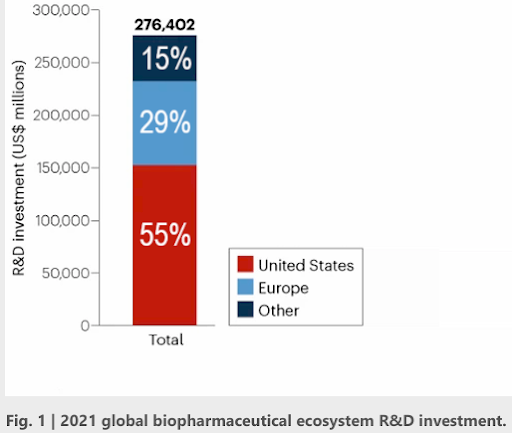With the ascendancy of MAHA, the pharmaceutical industry has come under attack from the right as well as the left. That is unfortunate. Has any institution done as much for human well-being over the last 150 years as the international pharmaceutical industry? I doubt it.
Continuing improvements in human health depend on continuing innovation in drugs. That is obvious, but short-sighted policy-makers–and voters–focus more on on reducing the costs of currently-existing drugs than on fostering the development of new drugs that will save lives, and improve lives, in the future. This sad political trend has been especially strong in Europe, so that pharmaceutical innovation has become mostly an American phenomenon.
The Unleash Prosperity Hotline has the data:
You may have seen that Merck has announced that it will cancel a proposed $1.3 billion research center in London and terminate its pharmaceutical R&D projects in the U.K.
Why? Merck decided to pull out of Britain because of “the overall undervaluation of innovative medicines and vaccines by successive U.K. governments.” Read: DRUG PRICE CONTROLS. This isn’t the result of any sudden overnight change of heart by Merck.
According to David Ricks, CEO of Eli Lilly: “The U.K. has been on a long, slow glide path from a leader in biopharmaceuticals to really a laggard, and that’s happened over the last 20 years through a number of policy mistakes.”
Many of the European nations have suffered the same fate of being shut out in the manufacturing of new drugs.
Sally Pipes of the Pacific Research Institute has done a terrific analysis: “the U.S. has swooped in to dominate the field.” She cites a Nature Reviews study that finds roughly 55% of the $276 billion of global pharmaceutical research and development investment in 2021 was by companies headquartered in the United States, compared with just 29% to Europe:
The numbers have no doubt gotten even more lopsided since then. Investment doesn’t equal results, of course, but there is no reason to think that investment by U.S. companies will be any less fruitful than investment by others. The lesson is that, if we want human health and longevity to continue to improve in generations to come, we should not suppress innovation. In particular, we should not yield to political pressure to make today’s drugs cheaper by seizing other people’s property, at the expense of future generations:
The lesson: drug price controls kill innovation, not diseases. Yet, the United States seems to be following the price control playbook that has resulted in the demise of Europe’s pharmaceutical industry.


















